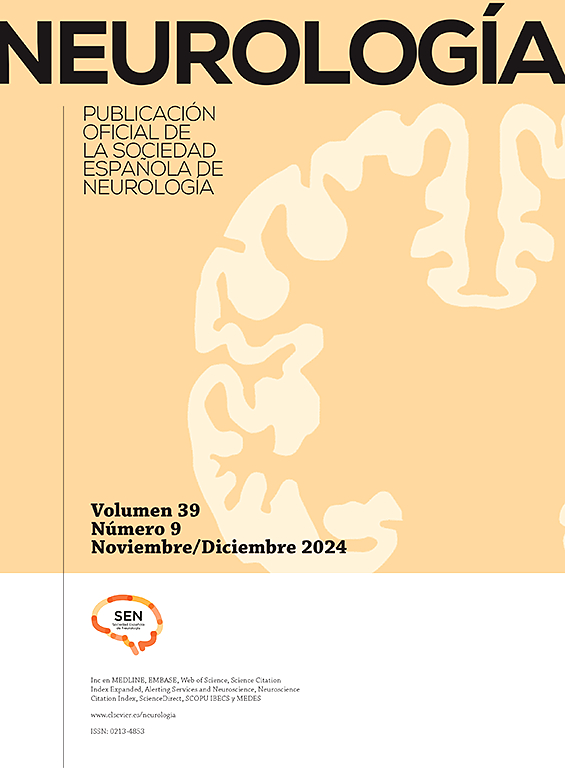Biomarcadores en sangre para la enfermedad de Alzheimer: posicionamiento y recomendaciones de uso del Grupo de Estudio de Conducta y Demencias de la Sociedad Española de Neurología
IF 3.1
4区 医学
Q2 CLINICAL NEUROLOGY
引用次数: 0
Abstract
Introduction
The development of blood biomarkers for detecting Alzheimer's disease (AD) represents one of the most significant recent advances, and some are already available for clinical practice. Therefore, the Grupo de Estudio de Conducta y Demencias de la Sociedad Española de Neurología has formed a working group to review the current status and develop consensus recommendations for their clinical implementation.
Development
This document was prepared by neurologists from the Grupo de Estudio de Conducta y Demencias de la Sociedad Española de Neurología in two phases. First, a coordinating group defined the basic guidelines of the document, agreed on initial recommendations based on a literature review, and drafted a preliminary version. Subsequently, the proposal was reviewed by the entire working group, all comments were considered, and the coordinating group adjusted the recommendations until consensus was achieved among the participants.
Conclusions
The consensus document highlights the importance of early diagnosis of AD. It recommends interpreting blood biomarkers in the patient's clinical context, not in isolation. Specialized units can start using them, but this should be accompanied by ongoing research. More data are needed for their use in general neurology and primary care. Their use is not recommended in asymptomatic individuals, population screenings, or as direct-to-consumer tests. Public health systems should facilitate their implementation through appropriate funding to ensure equitable access. This document should be understood as an initial framework subject to periodic updates as new data emerge.
阿尔茨海默病血液中的生物标志物:西班牙神经学会行为和痴呆研究小组的定位和使用建议
用于检测阿尔茨海默病(AD)的血液生物标志物的开发是最近最重要的进展之一,其中一些已经可用于临床实践。因此,社会老年痴呆症研究小组Española de Neurología成立了一个工作组,审查目前的状况,并为其临床实施制定共识建议。该文件由社会痴呆症研究小组Española de Neurología的神经学家分两个阶段编写。首先,一个协调小组确定了文件的基本准则,在文献审查的基础上就初步建议达成一致,并起草了初步版本。随后,整个工作组对提案进行了审查,审议了所有意见,协调小组对建议进行了调整,直到与会者达成共识为止。结论共识文件强调了早期诊断AD的重要性。它建议在患者的临床背景下解释血液生物标志物,而不是孤立地。专业单位可以开始使用它们,但这应该伴随着正在进行的研究。它们在普通神经病学和初级保健中的应用需要更多的数据。不建议在无症状个体、人群筛查或直接面向消费者的检测中使用。公共卫生系统应通过提供适当资金以确保公平获取来促进其实施。本文档应被理解为一个初始框架,随着新数据的出现,需要定期更新。
本文章由计算机程序翻译,如有差异,请以英文原文为准。
求助全文
约1分钟内获得全文
求助全文
来源期刊

Neurologia
医学-临床神经学
CiteScore
5.90
自引率
2.60%
发文量
135
审稿时长
48 days
期刊介绍:
Neurología es la revista oficial de la Sociedad Española de Neurología y publica, desde 1986 contribuciones científicas en el campo de la neurología clínica y experimental. Los contenidos de Neurología abarcan desde la neuroepidemiología, la clínica neurológica, la gestión y asistencia neurológica y la terapéutica, a la investigación básica en neurociencias aplicada a la neurología. Las áreas temáticas de la revistas incluyen la neurologia infantil, la neuropsicología, la neurorehabilitación y la neurogeriatría. Los artículos publicados en Neurología siguen un proceso de revisión por doble ciego a fin de que los trabajos sean seleccionados atendiendo a su calidad, originalidad e interés y así estén sometidos a un proceso de mejora. El formato de artículos incluye Editoriales, Originales, Revisiones y Cartas al Editor, Neurología es el vehículo de información científica de reconocida calidad en profesionales interesados en la neurología que utilizan el español, como demuestra su inclusión en los más prestigiosos y selectivos índices bibliográficos del mundo.
 求助内容:
求助内容: 应助结果提醒方式:
应助结果提醒方式:


